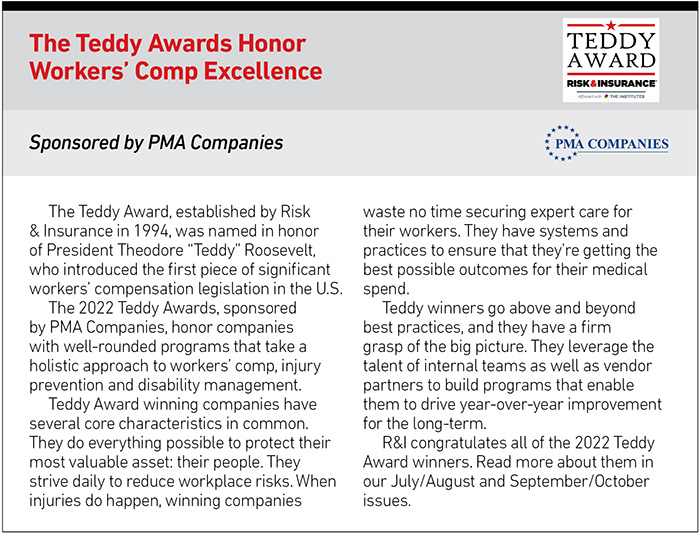Forever Raising the Bar: Why a Focus on Continuous Improvement Earned INTEGRIS Health Its Second Teddy Award

One evening in late April, Jennifer Milligan found herself excited for her first onsite OSHA survey as manager of disability management and caregiver safety for INTEGRIS Health.
Excitement? At the prospect of an OSHA survey? It’s a feeling few safety and disability managers can relate to. Nervous anticipation maybe, but to eagerly await an OSHA survey is unfathomable to many.
But Milligan knew that INTEGRIS Health had a valuable story to tell. One of supporting injured workers and proactively working to prevent injuries from happening using data from near-miss incidents. As she prepared for the survey over the course of two and a half weeks, she found herself reflecting on her 25 years at the company.
She was surrounded by colleagues who had helped her improve the program: Team members she had grown so close to, they had come to feel like a second family. She thought about the claims she had worked on and the countless lives her and her team had touched, especially as they helped their health care workers battle the pandemic over the last two years.
“I think some people either don’t understand what our work is, or they don’t really understand the gravity of what we do,” Milligan said.
“I look at the individuals that I’ve worked with on a day-to-day basis and related to this pandemic, it was like I was working with our family. We had a very open line of communication on a daily basis, sometimes on weekends, late at night.”
One such memory: Calling the wife of a caregiver — INTEGRIS Health’s moniker for their medical providers — and helping her navigate the oft-baffling workers’ compensation system.
It was one of the first calls Milligan made with Terri Preston, director of occupational health and employee wellness at INTEGRIS Health. The caregiver had been hospitalized and together the two women knew they wanted to provide as much support as possible to the family.
“You could hear the children playing in the background,” Milligan recalled. “I just remember walking through that discussion with that caregiver’s wife and the emotion behind that conversation.
“It was an intense feeling to be able to go in and share that with the surveyor,” she added.
This dedication — to workers with injuries and to preventing accidents in the workplace — has existed at INTEGRIS Health for the entirety of Milligan’s 25-year career. In 2006, the hospital system’s investments in safe patient handling equipment earned the nonprofit a 2006 Teddy Award.
Now, INTEGRIS Health’s efforts to continuously improve their workers’ comp program — despite the added challenges of a global pandemic — and its dedication to helping hospital workers with both physical and mental health challenges have earned its recognition for a second time as a 2022 Teddy Winner.
INTEGRIS Health: 30 Years of Workers’ Comp Excellence

Jennifer Milligan, manager of disability management and caregiver safety, INTEGRIS Health
The origins of INTEGRIS Health’s workers’ comp excellence can be traced to the mid-90s. INTEGRIS Health had just been formed as the result of a merger in 1995 between Oklahoma Health System and Southwest Medical Center in Oklahoma City.
At the time, then-VP of risk management Bill Wandel realized there was an opportunity to keep caregivers healthy by changing the organization’s workplace safety philosophy: “Once an injury has occurred, we’ve already lost,” Milligan said.
So Wandel took $50,000 and invested it in some lift equipment. Then, he and his team drafted a new safe patient handling policy. The program grew from there with a slip, trip and fall initiative and some education on how to properly dispose of sharps, resulting in a reduction in needle stick injuries.
Then he turned to the workers’ comp program. INTEGRIS Health developed a return-to-work and reasonable accommodation program to help caregivers heal and get back to work in a timely manner.
Now, the program is guided by INTEGRIS Health’s five values: integrity, compassion, accountability, respect and excellence.
Milligan came on board in 1997 as a specialist focused on facilitating the hospital system’s return-to-work program shortly after graduating from a master’s program at the University of Central Oklahoma.
She then advanced through the ranks, first through managing a team of nurse case managers and later serving as a director before coming into her current position.
“Jennifer’s program never slowed down,” Preston said. “She and her team are a well-oiled machine. They know what they’re doing. They have done it for years and they just do it well.”
Pillars of Continuous Improvement
Milligan believes INTEGRIS Health’s program is built on “pillars of continuous improvement.” The hospital system uses a program called Roadmap to identify sites with higher injury rates or incurred costs claims.
Milligan’s team then works with a committee made up of members from each of INTEGRIS Health’s facilities to address the safety hazards that may be leading to increased injuries.
In addition to tracking injury rates by departments and sharing best practices across the system, INTEGRIS Health utilizes an electronic injury and near-miss reporting system that allows caregivers to report any at-risk behaviors or physical hazards, so they can be addressed promptly by managers or the caregiver health and disability management teams.
This easy-to-use, digital tool has led to a 34% increase in reporting over the two years the system has been in place.
“We don’t want to wait until there’s a problem,” Milligan said. “So watching the near-misses come through — the sharps that are being found that may not be disposed of correctly, for instance. If we watch this trend, we can tackle it and follow up in those departments to prevent that needle stick. That could be life and career changing.”
One area where these systems have helped identify safety risks is slips, trips and falls. INTEGRIS Health experienced a 53% increase in incurred losses between 2017 and 2019 driven by an increase in slips, trips and falls caused by inclement winter weather. Milligan’s team led an awareness campaign to educate staff about walking safely on snow and ice. “I always believe that awareness is the first step toward reduction,” she said.
That additional education paid off. Milligan said that the hospital has reduced slips, trips and falls by 55% compared to last year.
“This award would not be possible without INTEGRIS Health’s commitment to caring for caregivers as our top priority. When INTEGRIS Health envisioned a safety culture, this is what we hoped to see. Our caregivers are always on the lookout for safety shares, stepping up to make necessary changes for injury prevention and caring for each other. Feeling supported by the organization allows them to take the very best care of our patients,” Wendy Chandler, Chief Human Resources Officer.

Another risk proactive assessments have helped diminish: workplace ergonomics. INTERGIS Health has conducted over 2,500 workstation evaluations over the past two years which have resulted in workstation modifications, new chairs, continuous investments in safe-patient handling equipment and the introduction of sit/stand desks for some caregivers.
These programs not only help reduce injuries; they help ensure workers who are returning to the job post-injury are staying safe. For Milligan, the way the safety and workers’ comp programs work together is key to INTEGRIS Health’s success.
When a worker is injured, their first treatments often come from INTEGRIS Health’s caregiver health team. Any injured workers who are referred to physicians outside of the system continue to receive support through telephonic case management.
When a worker has recovered enough to return-to-work, the organization’s transitional work plan, led by the caregiver health and safety teams in conjunction with the hospital’s Third Party Administrator, continues to offer the care they need to make a full recovery.
“It’s really exciting to see the program develop even more,” Milligan said. “The inclusion of all three disciplines is really going to set us apart from other organizations.”
COVID-19 Raises the Stakes

Terri Preston, director of occupational health and employee wellness, INTEGRIS Health
Like all hospital systems, INTEGRIS Health was put to the test when the COVID-19 pandemic reached the U.S. in March of 2020.
“We read into the event reports and you could actually see the fatigue coming out in the event reports itself,” Milligan said of the toll COVID-19 took on workers.
When the pandemic struck, INTEGRIS Health took all of the preventive steps we’ve become so familiar with: implementing increased personal protective equipment protocols, keeping track of the virus through daily safety huddles, giving daily updates to employees and making testing readily available. They also separated COVID claims management from the regular injury reporting system to help make the process more manageable.
Beyond the increased risk of contracting the virus many caregivers faced, physicians also suffered a mental health toll, working long hours with near constant exposure to illness and death. In a survey conducted during the height of the pandemic from June-September 2020 93% of health care workers reported feeling stress, 86% anxiety and 76% exhaustion and burnout.
“I think Jennifer’s team, as small as they are, has done an exceptional job of providing for the needs of people that have gone through these things for these past two years,” Preston said.
As with slips, trips and falls, INTEGRIS Health is approaching caregiver mental health struggles by leading with education. In April they led a month-long stress awareness initiative and in May they focused on mental health as a whole. Now, Preston is working to find a new Employee Assistance Program (EAP) to help workers with mental health challenges.
“We’re excited about getting that in place to be able to meet their needs in real time,” Preston said.
Increased mental health offerings have also come in handy when it comes to helping caregivers who have been involved in patient aggression events. Milligan and Preston recall one incident where, after a patient aggression event, the caregiver involved in the altercation was offered extensive psychological services as part of their recovery.
“There’s a mental aspect of it and a significant physical aspect of it,” Milligan said. “The therapy services that were provided from the system helped that caregiver get through that challenging segment of time in the weeks post event.”
All of this ties into the five values that guide INTEGRIS Health: integrity, compassion, accountability, respect and excellence.
That bedrock is what made Milligan excited to share her team’s progress during the OSHA survey this spring and it is what earned the system their second Teddy Award. &
Jennifer Milligan and representatives from all of this year’s Teddy Award winners will gather in October at National Comp 2022 for a special Q&A presentation. Meet the winners and learn more about their programs.











